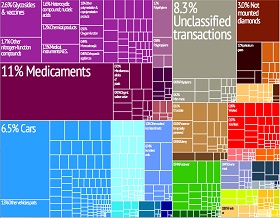In a record time of only four months after the parliamentary elections, the Belgians have formed a new government led by 38-year-old Charles Michel, the youngest prime minister since 1841. His emergence is building up suspense in Belgian politics since the prime minister represents the Walloon rather than the Flemish population and thus breaks a tradition that has existed since the mid-1970s.
In a record time of only four months after the parliamentary elections, the Belgians have formed a new government led by 38-year-old Charles Michel, the youngest prime minister since 1841. His emergence is building up suspense in Belgian politics since the prime minister represents the Walloon rather than the Flemish population and thus breaks a tradition that has existed since the mid-1970s.
The Two-and-a-Half
Modern Belgium was founded in 1830, when the Francophone Walloons, Dutch-speaking Flemish and the minute German community of Eupen-Malmedy decided to come together and form a single state. Thanks to its fast economic growth, basically in metallurgy and coal mining, Wallonia became the titular group, overpowering the relatively backward, agricultural Flanders. But in the mid-20th century, the situation radically changed, with the Walloon economy declining, to a great extent due to the loss of Congo, Belgium’s key source of raw materials in Africa. At the same time, Flanders was swept over by a wave of advanced modern technology, while Antwerp, its biggest city, grew into the largest European seaport. In the early 21st century, the economy of Flanders generated the bulk of revenue for the national budget, giving the Flemish grounds to insist that they are actually providing for the economically and socially weak Francophone population of the kingdom.
En Route to a Confederation
Flemish politicians began devising plans for dismantling the at times unitary state back in the 1970s, which pushed Belgium to adopt a new constitution, following a lengthy interparty discussion, that would secure its federative status in 1993. In the early 21st century, the constitution was augmented by the Agreement on Interregional Cooperation which gave the regions virtually a free hand over taxation, agricultural and foreign trade policies. The central government has retained only the right to acquire information on the above matters. However, powerful Flemish elites, influenced by the growing economic might of their region, were unwilling to finance the economically and socially weaker Wallonia and set out to legislatively consolidate the confederation concept. They would like to see each part of Belgium self-financed, with no significant allocations channeled to the center. The idea was naturally rejected by the Walloon elites of all party and regional traits. Hence, over the past 10-15 years, the Flemish initiative has resulted into an escalating drive towards the self-destruction of the country through the establishment of two independent states.
The Road to Nowhere
However, the scenario by no means fits either the realities of the Kingdom of Belgium or the European-wide context of the construction of a homogeneous European Union. The EU is not at all willing to see Belgium split, as its capital at the same time serves as its political and economic center that houses several dozen thousand Euro-bureaucrats and the offices of major European and global corporations. One more facet of the Belgian puzzle is the fact that Brussels is located in Flanders, but ninety percent of its residents are French-speaking Walloons. No one is willing to see another city divided Berlin-style.
The issue of the high-level government is also far from clear, with the Walloons viewing monarchy as the last resort, while the Flemish have a penchant for the republic. They would also like to divide the state debt that currently exceeds 90 percent of GDP [1]. Only further complicating the situation, a divorce would question the participation of the two Belgian states in NATO and the European Union, since these two institutions are unlikely to offer the aspirants any privileges as far as rigid accession norms are concerned.
The Realities of the 2010s
The plans of the Belgian statehood modernizers were modified by the economic, financial and social crises that overtook Europe in the fall of 2008. As a matter of fact, the Flemish economy was not nearly as strong as in the past and could barely provide Flanders with a cloudless existence in the status of a fully or partially independent portion of Belgium.
On the other hand, energetic actions by the EU and international financial hubs have managed to somehow settle the situation in the Eurozone and the European Union, offering the Walloons hope that supranational structures may extend a helping hand to the Belgian Francophone population in dire straits. Hence, the opposing political elites have managed to reach at least temporary compromises. Having retained key economic and financial government posts, the Flemish have ceded supreme authority to the Walloons, ostensibly with help from the new EU leaders for whom Euro-separatism is an eyesore on the no longer charming face of supranational Europe. It appears much easier to find a common political denominator for regional Belgian elites than to clear up the mess of the Flemish-Walloon strife which is unlikely to end in a predictable outcome. On the other hand, the peacemaker's toga perfectly matches the EU’s overall policy which prefers to nip all centrifugal trends in the bud, be it Great Britain, Spain, Italy or any other EU country.
However, the political environment of the small country of Belgium appears to be as volatile as the weather on its seashores. Every now and then, the situation evolves following purely Belgian traditions and laws, with separatism still alive though dormant. Depending on various factors, mostly socio-economic in nature, the Flemish elite may soon resurrect the confrontation between those ready to accept the status quo of a reformed federation and proponents of a confederation boosted by a vibrant separatist minority excited about setting Flanders on the track to independence.
1. Compass, ITAR-TASS, 2014, Issue 42, P. 5.







